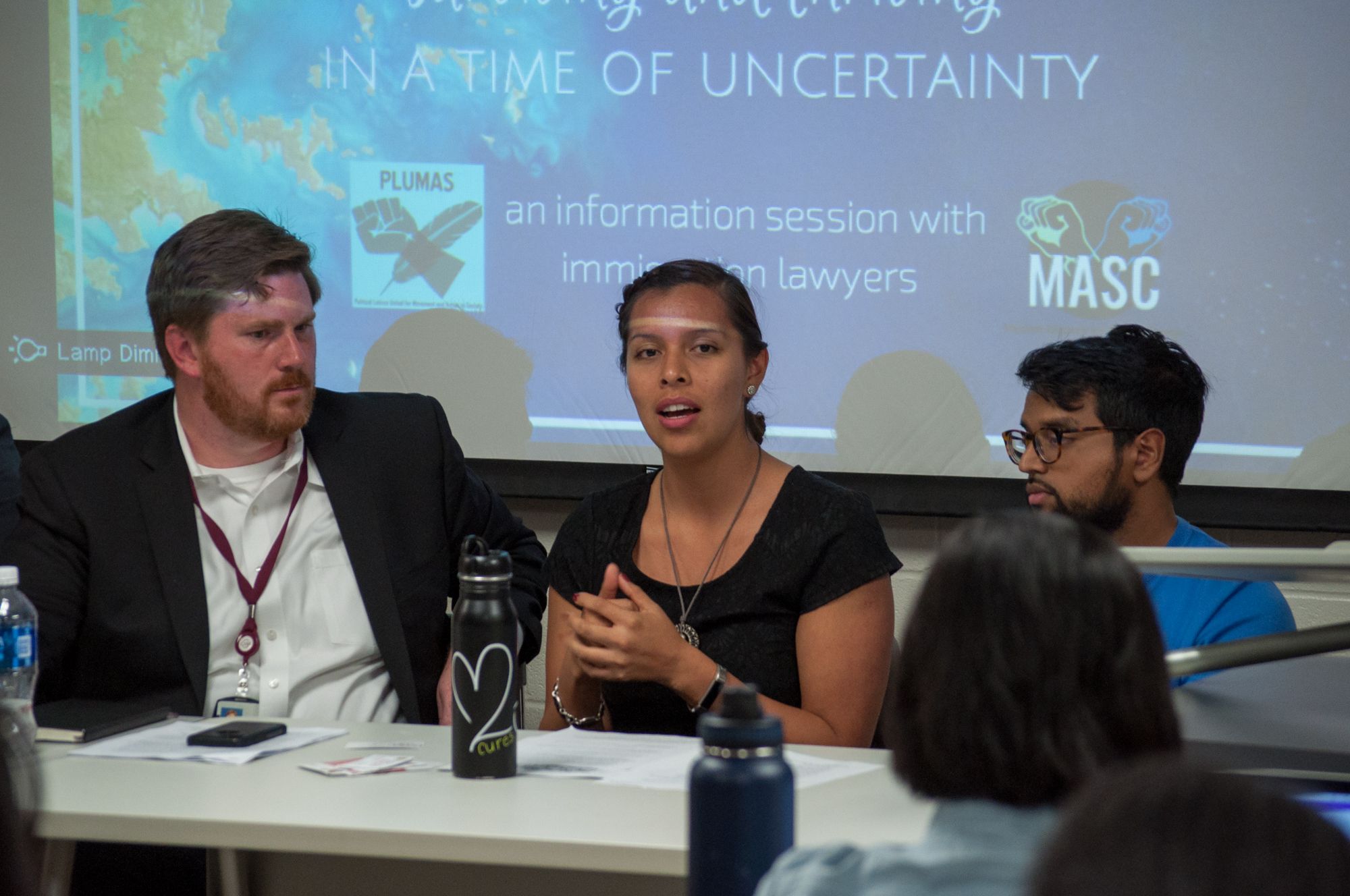Within the next few months, administrators at the University of Maryland expect to reach a final decision as to whether they will make the undocumented student coordinator position permanent, Stamp director Marsha Guenzler-Stevens said.
“This first term, this first semester, is really the one to sort of come to conclusions about the position,” she said, adding that they expect to reach a decision by next semester.
The administration created the role in 2017 amid student advocacy after the 2016 presidential election. A coalition of student activists, named ProtectUMD, made 64 demands to the administration to serve marginalized groups, one of which included the creation of a coordinator to aid undocumented students.
In the years since, Laura Bohorquez Garcia estimates she has offered resources, financial guidance and emotional support to at least 100 undocumented students at this university — all while working under a temporary contract that’s set to expire in June.
Since this is the final year the position can be temporary, the university must either terminate the position or extend it as a permanent role, administrators said. The Student Government Association voted in March to support making the position permanent, but it’s up to the university administration to make the call.
“We’re all committed to providing support to our undocumented students,” university President Wallace Loh told The Diamondback. “We will continue to offer resources and support for this.”
[Read more: UMD SGA supports making undocumented student coordinator a permanent position]
While nothing has been decided yet, Loh said, there are currently “no plans whatsoever to withdraw the position” that he’s aware of. And assistant student affairs vice president Warren Kelley said Bohorquez Garcia’s role “feels pretty crucial” for “the foreseeable future.”
During her time at the university, Bohorquez Garcia has seen undocumented students, students with undocumented family or students with some other form of “immigrant identity” in search of financial advice, emotional support or answers to complex questions about their legal status.
“I think that’s really also given them a sense of, ‘Okay, someone’s doing this for me and with me, and I can now focus my energy on something else,’” she said. “If you really want to recruit students and retain them, this position would be really important for that.”
Sources cited by a U.S. Department of Education report estimated about 65,000 undocumented students graduate from U.S. high school every year, and between 5 and 10 percent of them go on to higher education.
But in September 2017, President Donald Trump formally announced he would terminate the Deferred Action for Childhood Arrivals program, which offered undocumented individuals brought as children protection from deportation. The Supreme Court is set to hear arguments in a case about the issue in November.
Amid the uncertainty, Helen Cordero, a senior government and politics major and the social chair for Political Latinxs United for Movement and Action in Society, said having Bohorquez Garcia as a point person eases the burden on undocumented students who are preoccupied with school.
“They’re working their asses off trying to get their education,” she said. “If that position were gone, there’d be a lot more students that would be struggling than there are now.”
Though Bohorquez Garcia’s contract was originally set to expire this year, administrators decided in fall 2018 to extend it.
[Read more: UMD extended its undocumented student coordinator position — but it’s still not permanent]
One of the issues they’re facing is where to place the coordinator role. Currently, Bohorquez Garcia is housed in Stamp Student Union. But some, like senior environmental science and policy major Candela Cerpa, say undocumented students could be better served if the role were part of the Multicultural Involvement and Community Advocacy office.
“When they go to the office and ask for Laura, they kind of out themselves as undocumented students,” said Cerpa, PLUMAS’ vice president. “That’s a privacy concern for them.”
Many students, when they first enter her office, won’t disclose information about their background, Bohorquez Garcia said. She’ll ask questions and get a sense of the financial support or counseling services they might require before scheduling a follow-up meeting and introducing them to social media and a group chat.
“It’s almost like an intake process. You get a sense of what their needs are, beyond just getting to know the program,” said Bohorquez Garcia, who estimates she’s worked with many students for almost 30 hours each.
Erwin Hesse, who worked in admissions at this university between 2011 and 2015, understands this issue all too well. Following the passage of the Maryland DREAM Act in 2012, which offers in-state tuition rates to undocumented students who attend a public state university, Hesse — whose parents were undocumented when he was born — became the university’s unofficial undocumented counselor, he said.
“When that law passed, I just remember, no one trained us on anything,” said Hesse, who still has undocumented family. “No one did a training on how to properly recruit this population, how to talk in a sensitive way to this population, how to ask questions to approach it.”
His peers, many of whom were uncomfortable asking questions to undocumented students, directed them all to Hesse’s office. He often worried about the future, wondering what would happen to undocumented students in need of guidance after he was gone.
The campus is making progress, Bohorquez Garcia said. She often works with students who have been at the university longer than she has, and said many of them say the position has helped create a greater sense of community for undocumented students on the campus.
PLUMAS is working to push the administration to give Bohorquez Garcia a permanent contract, Cerpa said. They plan to meet with the student affairs office to talk about how to move forward — whether by communicating the needs of undocumented students or by reminding them of Bohorquez Garcia’s “vital role” on the campus.
“We want it to be permanent so we don’t have to go through this every single year,” Cerpa said.



